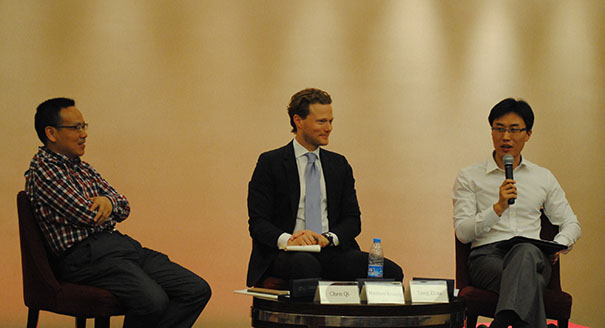Registration
You will receive an email confirming your registration.
Amid rapid economic and geopolitical change, the global order is in a period of transition. Recent China-led initiatives such as the New Silk Road and the Asian Infrastructure Investment Bank demonstrate that the world’s center of gravity increasingly is shifting toward Asia.
Carnegie–Tsinghua’s Chen Qi hosted a discussion with Matthew Kroenig about the evolving global order. Kroenig presented his perspective on the U.S. role in the international system and offered his assessment on how U.S. economic arrangements and political traditions shape the international order.
Discussion Highlights
- Sino-U.S. Great-Power Geopolitics: Panelists suggested that Sino-U.S. economic and geopolitical competition coexists with areas of mutual interest and potential cooperation, such as climate change, nuclear nonproliferation, and counterterrorism. They suggested that rather than dwelling on ideological differences, Beijing and Washington should emphasize constructive dialogue to expand avenues for cooperation and manage areas of disagreement.
- China’s Role in Multilateral Institutions: China’s rapidly growing economic and military capacities draw a lot of interest, but participants asserted that China’s role in multilateral institutions deserves more attention. They mentioned that China led-initiatives, such as the AIIB and the New Silk Road, will attempt to address a clear regional need for infrastructure financing, but that it remains uncertain how these institutions will interact with existing ones like the World Bank and the Asian Development Bank.
- Recent Trends in Economic Growth: Participants noted that China’s rapid economic growth seems to be transitioning to a slower, steadier pace, as the country’s economy enters a new development phase. U.S. economic growth, while slower than that of China, appears to have gained momentum in recent years from technological innovation and the shale gas boom, panelists observed. They acknowledged that United States remains pivotal to international finance, given the position of the U.S. dollar as the world’s most widely exchanged currency. Participants concluded that although both countries face domestic challenges, they likely will remain the world’s top two economies well into the future.
- Different Takes on Bilateral Diplomacy: Panelists pointed out that China and the United States have very different approaches to diplomatic ties with other states. They described how Washington has long focused on building a close network of allies and partners—such as Japan and South Korea—as a means of advancing common interests. Beijing, meanwhile, views alliances as costly and time-consuming to build and maintain. China, therefore, focuses instead on fostering cordial but nonaligned relations with other countries so as to promote balanced regional harmony, participants explained. China’s approach has yielded impressive results, such as bolstering trade volumes with Europe and enhancing energy cooperation with Russia.
- Strategic Stability in the Asia-Pacific: Coinciding with China’s rapid economic growth in recent decades, its military expenditures and capabilities have increased as well, panelists noted. They predicted that as the country’s national power continues to expand, China will become better-equipped to defend its regional interests more assertively. The U.S. decision to redirect key economic, diplomatic, and security resources to Asia, meanwhile, demonstrates Washington’s recognition of the region’s importance. Speakers concluded that Asia’s security landscape will continue to evolve and that military-to-military dialogue will play an important role in maintaining stability.
Matthew Kroenig
Matthew Kroenig is an associate professor and the international relations field chair in the Department of Government and the School of Foreign Service at Georgetown University. His research examines U.S. national security policy and strategy, international relations theory, and nuclear deterrence and nonproliferation.
Tong Zhao
Tong Zhao is an associate in Carnegie’s Nuclear Policy Program based at the Carnegie–Tsinghua Center for Global Policy. His research focuses on strategic security issues, including nuclear arms control, missile defense, strategic stability, and China’s security and foreign policy.
Chen Qi
Chen Qi is a resident scholar at the Carnegie–Tsinghua Center for Global Policy and vice chair of Tsinghua University’s international relations department. His research interests include U.S.-China relations, global governance, and China’s foreign policy.
